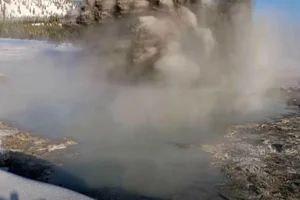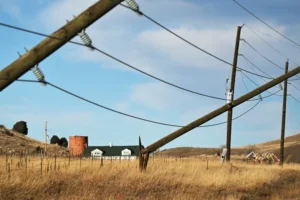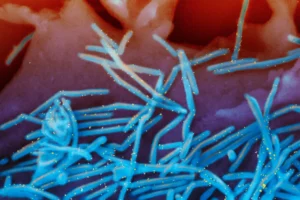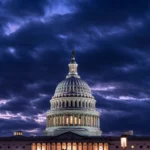Wyoming Tribal Leaders Push Supreme Court to Uphold the Indian Child Welfare Act
Supporters argue the law preserves tribal sovereignty and culture
- Published In: Other News & Features
- Last Updated: Nov 10, 2022

Pictured above is the U.S. Supreme Court building. The court’s justices heard oral arguments in the Brackeen v. Haaland case, which challenges the Indian Child Welfare Act. (Courtesy photo)
By Shen Wu Tan
Special to the Wyoming Truth
Tribal leaders in Wyoming and the ACLU are urging the U.S. Supreme Court to uphold a longstanding law that keeps Native American children with Native American families when they come up for adoption or foster care.
The high court heard oral arguments Wednesday in the Brackeen v. Haaland case in which several prospective adoptive parents and the state of Texas are challenging the Indian Child Welfare Act (ICWA). In 1978, Congress passed the law in response to the removal of Native American children from their homes by child welfare agencies and their placements into homes with no tribal connections.
“We’re hoping and praying that the U.S. Supreme Court upholds ICWA because if it is struck down, our children, our culture, our sovereignty and even our very existence as a tribe would be again placed in jeopardy as it was prior to the act,” the Eastern Shoshone Business Council told the Wyoming Truth. “If struck down, we could potentially face new hurdles and challenges when it comes to placing Native children in Native households.”
Sergio Maldonado, a member of the Northern Arapaho Tribe in Wyoming, described the Supreme Court case challenging the law as a “thinly veiled attempt of federal racism.”

“Tribal people have been fighting the racist wars and blatant attacks on our people since their arrival,” Maldonado added. “ICWA was our attempt at protecting the children. Remember, ‘Suffer not the children?’ This is about our tribal sovereignty, internationally recognized for centuries, but [the] f—— United States still has an ax to grind with tribal people…Tribes have litigated to the greatest lengths to secure our sovereignty, yet this racist country wants more and more?”
State and private agencies removed an estimated 25% to 35% of all Native American children from their families and communities and placed them into non-Native American foster and adoptive homes. according to the Bureau of Indian Affairs.
The ICWA provides guidance to states on how to address cases of child abuse and adoption of Native American children and establishes a preference for the children to be placed with extended family members or with Native American foster or adoptive families. When the law is applied to a case, the child’s tribe and family have a chance to help make decisions regarding services and placements for that child. A petition can also be submitted to have the case transferred to the child’s tribal court.
On the opposing side of the Supreme Court case, the state of Texas and several families seeking to adopt Native American children argue that the Indian Child Welfare Act violates states’ autonomy in handling cases and creates an unconstitutional racial preference.
Chad and Jennifer Brackeen are two of the prospective adoptive parents who are challenging the law. The non-Native American couple, who are based in the Dallas- Fort Worth area, adopted a boy born to a Navajo mother and a Cherokee father. They are now trying to adopt the boy’s sister.
“It’s heartbreaking to us that there are laws out here that say it’s better for her to live in a tribal home, any tribal home … before she is allowed to stay in our home with her brother,” Chad Brackeen told NPR.
The Brackeens could not be reached for comment for this story. Their attorney, Matthew McGill, did not respond to requests for comments.
Last month, Wyoming’s Select Committee on Tribal Relations discussed potential legislation that would establish a task force to look at existing protections and provisions for Native American children in state statutes and to study the ICWA and similar legislation in other states, according to the Eastern Shoshone Business Council.
The task force would allow two members from the Eastern Shoshone and Northern Arapaho Tribes to serve on the 13-member task force. The group also would have to develop recommendations for protections and procedures for Native American children no later than July 1, 2024.
Rep. Lloyd Larsen (R-Lander), who serves as the chairman for the Select Committee on Tribal Relations, said Wyoming is “a bit unique” because it provides funding to the family services departments for the Eastern Shoshone and Northern Arapaho Tribes. Their contracts mandate that the tribal family services agencies must intervene in protective custody cases on and off the reservation when Native American children are involved. If a court must intervene in a case, then the matter is referred to the tribal court, he added, which aligns with the intent of the ICWA.
“If ICWA is overturned, the large majority of cases in the state, which take place in Fremont and Hot Springs Counties, would continue to function as though ICWA was still in place,” Larsen told the Wyoming Truth. “Protective custody cases around the rest of the state involving Native American children would no longer require consultation with the child’s tribe and the placement of these children would less likely be with family members or other tribal members.”
Additionally, the Wyoming Department of Family Services will research more to codify existing child welfare policy under the agency’s authority and plans to preserve existing ICWA policies and procedures to the legal extent possible, said Clint Hanes, the department’s spokesperson.
“Regardless of what happens with ICWA, the Department of Family Services (DFS) believes all children deserve to be safe at home,” Hanes said. “DFS will continue to support the tribes, and all Wyoming families, by engaging in efforts to place children with family and kin if they cannot remain safely at home. DFS is committed to ongoing collaboration with all members of federally recognized tribes in order to achieve the best outcomes for children, youth and families.”
The Biden administration, along with hundreds of tribal nations and other organizations, including the ACLU of Wyoming, have expressed their support for the Indian Child Welfare Act. The ACLU filed an amicus brief in August pushing the Supreme Court to uphold the constitutionality of the law.
“To roll back the protections the Indian Child Welfare Act provides could return us to an era where Native children were indiscriminately torn from their families,” said Stephanie Amiotte, ACLU of Wyoming legal director and a member of the Oglala Lakota (Sioux) Tribe. “This was a key part of centuries-long history of forced Native child removal as a tool of cultural genocide.”













